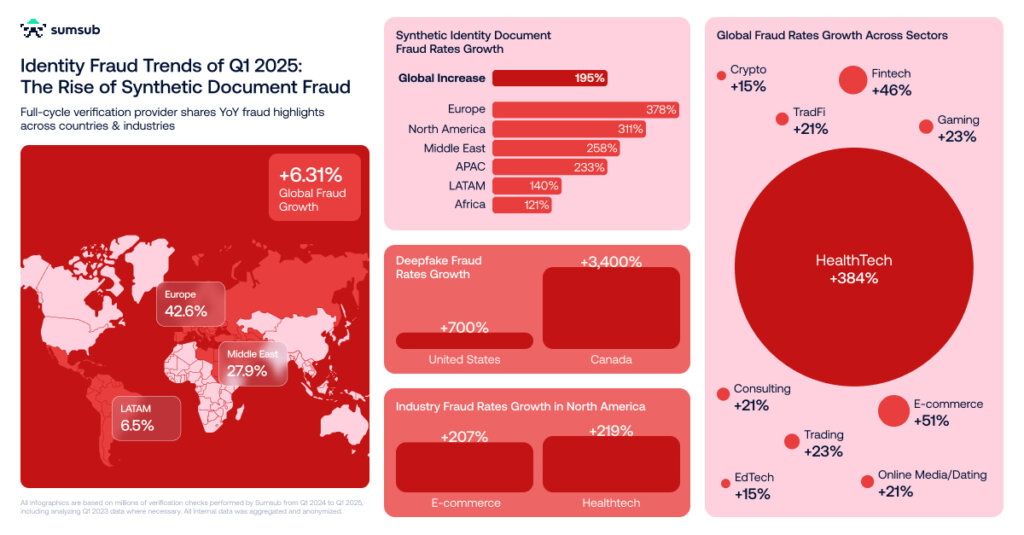North America sees major spike in synthetic document fraud and deepfake-related attacks, particularly across e-commerce, edtech, and healthtech sectors
Sumsub today released Q1 2025 identity fraud trends based on internal data, revealing a dramatic rise in AI-enabled fraud across the United States. According to platform data, deepfake fraud has surged by 1100%, while synthetic identity document fraud rose by over 300% with attackers exploiting generative AI to create fake passports, IDs, and biometric data.
Sumsub analyzed millions of verification checks conducted on its platform between January and March 2025 across industries such as fintech, e-commerce, healthtech, and edtech to uncover emerging fraud trends. One of the most pressing concerns is the rise of synthetic identity document fraud, where criminals use AI tools to generate fake identity documents such as driver's licenses or passports. These synthetic identity documents are often realistic enough to bypass basic KYC checks, posing a significant challenge for businesses. Unlike synthetic identities, which involve the creation of entirely fake personas using a mix of real and fabricated data, synthetic identity documents refer specifically to falsified documents or images generated by AI. Fraudsters then use these AI-generated visuals to open accounts, conduct illicit transactions, or bypass compliance processes, making detection increasingly difficult without advanced verification tools.

North America-Specific Insights (Q1 2025):
- Synthetic identity document fraud spiked by 311% in North America compared to Q1 2024, making it the region's most alarming growth vector.
- Deepfake fraud jumped by 1100%, marking a clear signal that generative AI is being used to bypass facial recognition and biometric checks.
- High fraud activity was recorded in e-commerce, healthtech and edtech––industries have seen accelerated digitization post-pandemic.
- The U.S. in particular saw a sharp increase in fintech fraud attempts, underscoring the need for real-time, multi-layered fraudprevention solutions.
Key Global Findings (Q1 2025):
- Synthetic identity document fraud is rising across all regions, fueled by widespread access to GenAI tools that can generate highly realistic fake IDs. Top markets for synthetic identity document fraud include:
- Ethiopia (2.17%)
- Pakistan (2.08%)
- Nigeria (1.52%)
- Other notable markets: Hong Kong (0.99%), Indonesia (0.84%), Turkey (0.80%)
Deepfake-related attacks are growing globally, particularly to bypass biometric systems—now one of the fastest-evolving fraudvectors.
- Healthtech fraud attempts rose by 384%, signaling its emergence as a high-value target alongside fintech and e-commerce.
- Regional deepfake fraud surges:
- Canada: 3,400%
- Hong Kong: 1,900%
- Singapore: 1,500%
- Mainland China: 1,183%
- Germany: 1,100%
- United Kingdom: 900%
- United States: 700%
"The pace at which fraud tactics are evolving is staggering," said Andrew Sever, co-founder and CEO of Sumsub. "As generative AI becomes more accessible, so does the ability to generate synthetic identity documents and deepfakes at scale. What we're seeing is a broader trend, in which Fraud-as-a-Service is becoming a reality, where malicious actors can easily access sophisticated tools to carry out attacks. Businesses can no longer rely on outdated verification tools. It's imperative they adopt an intelligent, adaptive approach to stay ahead."
To combat this new wave of fraud, Sumsub continues to invest in advanced AI-powered fraud detection, document authenticity analysis, and biometric defense tools to protect businesses and users worldwide. The company urges organizations to stay proactive by integrating multi-layered verification and continuous monitoring into their onboarding and transaction workflows.